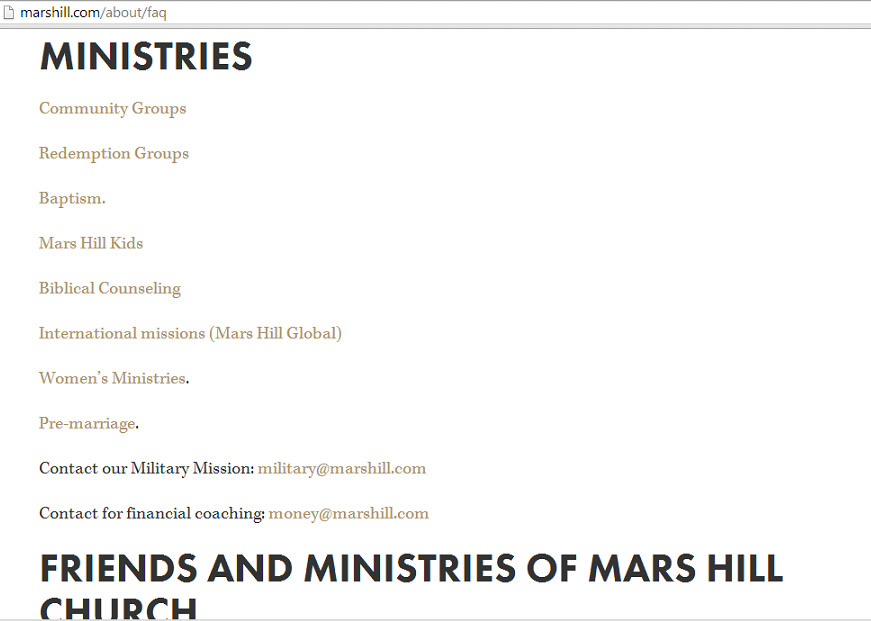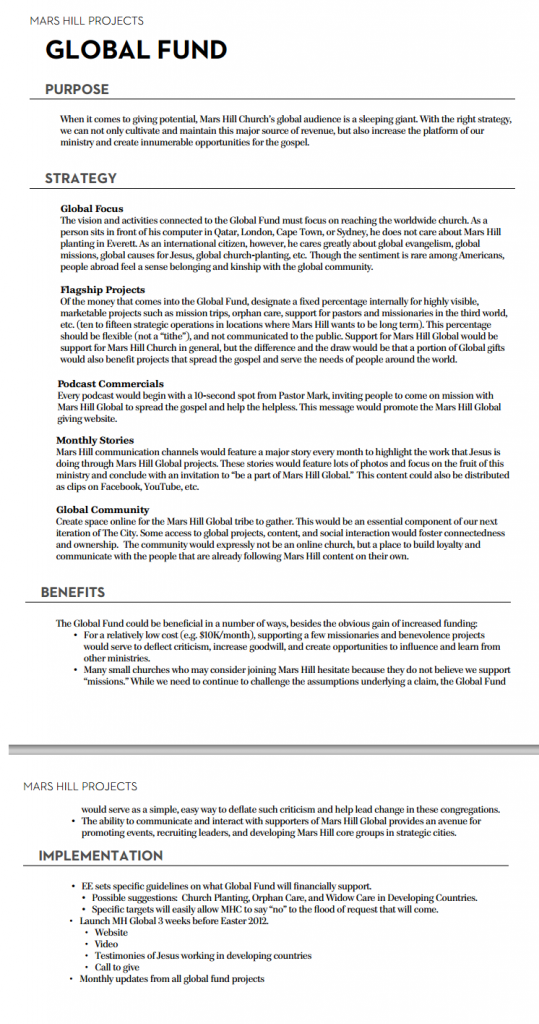In light of the memo I posted on October 1 and yesterday’s post, I now have a workable theory about why Mars Hill location pastors waited until after May 2014 to acknowledge publicly the money they received from Mars Hill Global.
Here is what the memo said about how Global Fund donations would be spent:
Global Focus
The vision and activities connected to the Global Fund must focus on reaching the worldwide church. As a person sits in front of his computer in Qatar, London, Cape Town, or Sydney, he does not care about Mars Hill planting in Everett. As an international citizen, however, he cares greatly about global evangelism, global missions, global causes for Jesus, global church-planting, etc. though the sentiment is rare among Americans, people abroad feel a sense belonging and kinship with the global community.
Flagship Projects
Of the money that comes into the Global Fund, designate a fixed percentage internally for highly visible, marketable projects such as mission trips, orphan care, support for pastors and missionaries in the third world, etc. (ten to fifteen strategic operations in locations where Mars Hill wants to be long term). This percentage should be flexible (not a “tithe”), and not communicated to the public. Support for Mars Hill Global would be support for Mars Hill Church in general, but the difference and the draw would be that a portion of Global gifts would also benefit projects that spread the gospel and serve the needs of people around the world.
In 2011, Mars Hill Church needed money for U.S. expansion. As the memo said, Mars Hill’s global audience would be more likely to donate to global missions than to Mars Hill’s U.S. expansion. So the church branded Global as Mars Hill’s ministry for international missions and funded a few international projects to bring in more money from people outside the Mars Hill membership (at the same time, Global was marketed to members too as another way for them to give “over and above” their tithes). Alerting donors that most of the donations funded U.S. expansion might erode support so, as the memo says, the disbursements would not be disclosed to the public.
After the Global Fund went away in May 2014, two Mars Hill campus pastors came out of the closet about the source of some their start up funding. Mars Hill Tacoma said thank you on August 4, 2014 and Mars Hill Everett on June 5, 2014. In July, an article by Thomas Hurst, lead pastor at Mars Hill Bellevue also referenced Global help but that situation is different from the other two because Bellevue’s funding came in 2011 before the Global Fund rebranding into an international mission brand. Furthermore, Bellevue’s assistance from the Global Fund was disclosed to the church and was consistent with how the fund was marketed to the church at the time. The rebranding of Mars Hill Global was suggested in November 2011 and carried out in 2012.
The articles about Tacoma and Everett were posted after my initial reporting on Mars Hill Global and the Global Fund in May 2014, and long after the money had been taken by Mars Hill leaders from the Global Fund and used for expansion at those two locations. Let’s look at each one.
Mars Hill Tacoma
On August 4, 2014, Tacoma pastor Bubba Jennings wrote on the Mars Hill website that Mars Hill Global helped with the purchase of the Tacoma building:
We would not have been able to buy our new home and relocate without the help of Mars Hill Global—thank you all very, very much for helping us! You made our dream of having a permanent home come true.
The purchase of the Tacoma building was announced on December 3, 2012. Although the church did not move in permanently until December 2013, Jennings thanked Mars Hill Global for help with the building purchase which was accomplished in late 2012 (during the fiscal year ending in June 2013). In the December 2012 announcement of the building purchase, there is no credit given to the Global Fund or Mars Hill Global. According to that announcement, funding for the building and retrofit came from a “magical night” of fundraising in September 2012 as well as additional fundraising solicited in big bold letters:
HOW TO GET INVOLVED, PLEASE VISIT THE MARS HILL TACOMA PAGE FOR MORE INFO. DURING HE MADE US FAMILY, OUR GOD’S WORK, OUR WITNESS 2012 CHRISTMAS SERMON SERIES, PLEASE CONSIDER A GIFT ABOVE AND BEYOND YOUR NORMAL GIVING. THOSE FUNDS HELP SUPPORT PROJECTS SUCH AS TACOMA, THE PURCHASE OF A NEW BUILDING IN EVERETT, THE REBUILDING OF OUR NEW DOWNTOWN SEATTLE LOCATION, AND MORE. YOU CAN GIVE TOWARDS THESE PROJECT BY CHOOSING THE “GENERAL CHURCH FUND” AT MARSHILL.COM/GIVE.
Please note that donors to Tacoma were not directed to the Global Fund, but to the “General Church Fund.” Why did Sutton Turner not thank Mars Hill Global in 2012? Why did Bubba Jennings wait until after the Global Fund was discontinued to thank Mars Hill Global for the help?
In the FY 2013 Mars Hill Church annual report, there is a page dedicated to Mars Hill Global expenses. Mars Hill Tacoma is not listed there. In fact, only expenses in India and Ethiopia are listed. Tacoma is referred to in the FY 2013 report but not in connection to Mars Hill Global.
In this gushing, thankful 2013 article on fund raising for the Tacoma location, there is no mention of the Global Fund, or a group of global givers:
A THANKS TO EVERYONE INVOLVED, ESPECIALLY JESUS
I want to sincerely thank everyone who has generously given to the Mars Hill Tacoma building fund. I want to thank everyone who has sacrificed their time and energy to be present at the building, helping with various work projects. I want to thank the Executive Elder team, Pastor Mark, Pastor Dave, and Pastor Sutton, for their tremendous support and leadership throughout this project. I want to thank the Mars Hill Central staff for all of their support—their leadership and help has been vital. I want to thank the leaders and members of Mars Hill Federal Way for their faithfulness and perseverance, leading the way in love and sacrifice. I want to thank the entire body of Mars Hill Church for praying for us. Lastly, and most importantly, I want to thank Jesus—without him, none of this would be possible.
Jennings here said he wanted to “sincerely thank everyone” who gave to the Tacoma building fund. Why did it take another nine months to thank Mars Hill Global? Theory one: Mars Hill Global didn’t really give any money to Tacoma. No one thought to say thanks to podcasters since they weren’t publicly asked for money for that purpose. However, in May 2014, Mars Hill leaders needed to create a narrative that involved Global Fund money going to church planting in the U.S. Theory two: Mars Hill leaders didn’t want anyone to know that money solicited for missions was really going to buy buildings and launch Mars Hill locations, so they didn’t bring it up at the time.
Mars Hill Everett
On June 5, 2014, Everett pastor Ryan Williams wrote on the Mars Hill website that Mars Hill Global helped with the down payment on the Everett building:
Our people work super hard and are amazingly generous to the church, but we just did not have the income to fully fund our own down payment and renovation expenses.
Mars Hill Global, that is exactly what you did for Mars Hill Everett and we thank you! Your generosity has allowed us to have a visible presence in our city and county. It has given us a building in which to love and care for hurting people and a place to hold services where the gospel will be proclaimed for, God willing, the next few hundred years.
On January 31, 2013, Mars Hill Church closed the purchase of a vacant national guard armory in Everett for $1.25 million. Williams credited Mars Hill Global for help with the down payment. Everett’s story is similar to Tacoma’s: more Global money spent in FY 2013 but no mention of it until June 2014. Why no mention of this until nearly two years after the fact?
As with Tacoma, there was a massive fundraising effort to renovate the new building with no mention that Mars Hill’s global audience or the Global Fund was kicking anything in.
The question remains: Why did Mars Hill Tacoma and Everett wait until 2014 to thank Mars Hill Global?
My theory is that the church operated in accord with the recently disclosed November 2011 Global Fund memo. Consistent with that memo, the destination of the Global Fund donations was not disclosed to the public while the fund was a giving option for members and non-members. It was only after the fund went away that Mars Hill offered any information about the way the funds were spent. If the church was operating transparently, these expenses would have been disclosed during the FY 2013 annual report, but since Global audiences might not knowingly donate to U.S. expansion, the church did not disclose the actual use of the funds.


